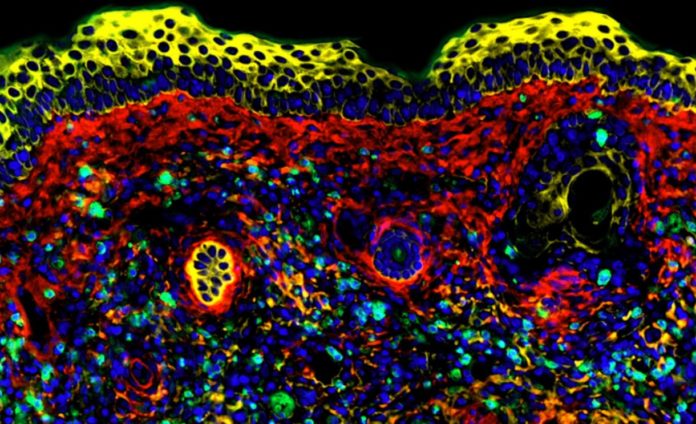The natural killer cells of the immune system can be activated to fight against cancer and other diseases, according to a new study.
A new discovery by scientists reveals that specific proteins surrounding organs and tissues inhibit the “killing” activity of natural killer cells. The cells could be reactivated if these interactions are blocked.
Natural killer (NK) cells, which are part of the body’s innate, or first-line, immune response, interact with tumor cells, viral infections, and solid organ transplants, according to new research.
The findings, which were discovered by researchers at Massachusetts General Hospital (MGH) and published in Science Advances, could be utilized to help protect patients from cancer, invading infections, autoimmunity, inflammatory illnesses, and transplant rejection.
NK cells can successfully kill target cells in the blood, but not diseased or malignant cells in tissues and organs such as the skin, gastrointestinal system, pancreas, or breast.
“This profound lack of NK cell killing function in solid organs has perplexed the field of NK cell biology for the last 60 years,” explains Shawn Demehri.
In recent years, Demehri’s research has revealed a fresh reason for why NK cells in solid organs lose their ability to destroy target cells: Organs are made up of cells that are embedded in a dense extracellular matrix (ECM), which is a complex protein matrix that serves as a scaffold to keep organ structure and integrity.
When NK cells exit blood arteries and enter solid organs, interactions with ECM proteins cause an abrupt transformation in NK cell activity from killer to helper cell. NK cells generate chemicals that activate and support surrounding immune cells as helper cells.
The rapid killer reaction of NK cells in the blood and the delayed helper response of NK cells in tissues and organs, according to Demehri and his colleagues, can be explained by an evolutionary selection pressure to extend human longevity.
“Infection of the blood requires immediate control by NK cells to ensure host survival,” adds Demehri, “however, the suppression of a direct killer function of NK cells in the peripheral tissues may prevent over-reaction to localized insults, which could predispose the patient to excessive tissue damage and the development of chronic inflammation.”
“Meanwhile, a helper function for the development of an overall more targeted, appropriately strong adaptive immune response may be best suited to combat viral infections in peripheral tissues.”
In this new study, the researchers used skin transplantation and mouse melanoma models to figure out which ECM proteins, collagens and elastin, are the main regulators of NK cell function in tissues and cancers.
“Our fundamental discovery of how NK cells are regulated in peripheral tissues has wide-ranging implications for patients with various health conditions,” says co–lead author Maulik Vyas. “Strategies to modulate NK cell–ECM interplay in organs can provide novel therapies to combat solid cancers, viral infections, inflammatory conditions, autoimmune diseases, and fibrosis, and to improve organ transplantation.”
For the first time, the researchers demonstrated that losartan, a routinely used blood pressure medication, can cause a previously resistant melanoma to become susceptible to NK cell death by preventing collagen formation in the tumor. Collagen is prominent in solid tumors, such as breast and pancreatic malignancies, making this discovery relevant.
“Our data strongly support the concept of blocking collagen–NK cell interactions in combination with current immunotherapies for optimal treatment of solid cancers,” adds Vyas. “And our findings provide a strong rationale for future research to fully understand how ECM proteins regulate NK and other immune cell responses in health and disease. This will greatly expand the development of future therapies that exploit the interactions between ECM proteins and the immune system in the treatment of a large variety of diseases.”
Image Credit: Getty
You were reading: New study shows how to boost the immune system’s natural killer cells to fight infections and cancer
